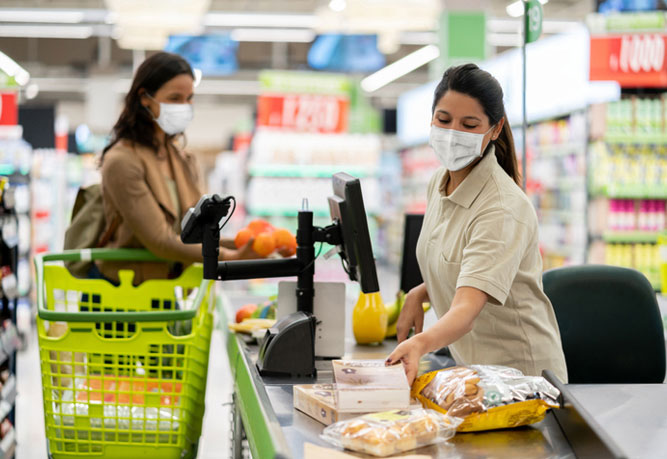As the pandemic rages on, and many retail locations remain open, retail employee safety concerns are, understandably, front and center. They’re on the front lines interacting personally with people of all kinds — some vaccinated, some not, some wearing masks, some not, some perhaps even sick.
That can be unnerving, to say the least, and adds another layer of complexity for employers already in a sector where turnover is high and good staff members can be hard to find.
Jaime-Alexis Fowler is the founder and executive director of Empower Work, a national nonprofit that offers a crisis text line for workers. She says: “What we see across hundreds of thousands of messages at Empower Work, particularly from folks in retail: people are absolutely concerned about their personal safety.” Every day, says Fowler, “we hear the hurt, frustration, burnout, fear, as employees share with us how vulnerable and at-risk they are when employers aren’t clear about or don’t enforce safety measures.”
The result: they don’t feel valued.
“When that happens, there’s a ripple effect impacting their work and their lives,” Fowler says.
Especially now as pandemic concerns continue, there are a number of important steps retail employers and their managers and supervisors can take both to help ease the potential concerns that employees may have about their safety and to provide a workplace environment that is, indeed, safe.
The most important steps retailers can take are related to physical and visible efforts to provide a safe work environment.
Make a Concerted, Visible, Effort to Focus on Safety
Joe Heaney is president of Lotus Biosecurity and an expert on indoor air quality, infection mitigation and COVID-19 safety. “Solutions start by simply upgrading your HVAC filter, and can extend to UVC cleaning technologies and much more,” says Heaney. “If businesses want their customers and staff to feel safe, basic biosecurity measures can go a long way.”
Anjela Mangrum, president of Mangrum Career Solutions, agrees that the best way to reassure employees and make them feel safe is to actively take steps to reduce transmission. For example, she suggests:
- Making employee isolation mandatory in case of a positive COVID test. “I can’t stress enough how important it is for retail organizations to have a clear-cut set of rules in case an employee gets diagnosed with COVID,” Mangrum says. “You shouldn’t allow such workers to come to work before completing the recommended isolation period at home. If an employee shows symptoms of the disease, encourage them to get tested and follow up.”
- Encourage regular hand washing and sanitization. Make hand sanitizers, soap, and clean water readily available for both employees and customers she recommends.
- Follow appropriate distancing measures. Set up physical barriers. Use floor stickers to make distanced positions in queues. Consider putting up clear barriers at counters.
- Try to get your entire team vaccinated.
- Regularly check fever/symptoms of staff and customers. “A very straightforward way to minimize the spread of infection is to have someone with an infrared thermometer at your store’s entrance to filter out people having fever, cough, or runny nose,” she says. “Seeing you take these measures will help employees with safety concerns come to work more confidently.”
In addition to these important steps, Michael Moran, the owner of Green Lion Search Group, who works with retail employers to help them develop competitive recruitment strategies, recommends that retailers consider hiring additional staff to focus specifically on safety-related activities.
“Instead of expecting front-line workers who are serving customers and manning shelves to enforce COVID-19 safety standards, hire a few more people to do work such as sanitizing shopping carts and crowd control,” Moran suggests. “Consider hiring a COVID-19 manager who will be in charge of ensuring the entire establishment is completely safe for employees and customers.”
In addition, Moran says, retailers should be taking steps like minimizing the number of in-store customers. This, he says, “can go a long way in easing front-line employees’ concerns.” He recommends retailers also consider taking steps to limit work hours to avoid overcrowding, giving employees enough time to focus on sanitizing and using curbside pickups and self-checkout to help employees find time to focus on more essential tasks.
Making safety a visible priority will not only benefit your employees but, particularly in retail settings, your customers as well.
There are some additional actions retailers can take to help ease retail employee safety concerns.
Be Explicit About Expectations and Follow Through
Employees want strong, clear guidance, says Fowler — and they want their employers to be consistent with reinforcement. “If masks are required, enforce that requirement. If someone is sick, support them to stay home—including paying for their time to be home. If a worker has been in close contact with someone with COVID, pay for their time to quarantine. Ensure that they are COVID-free when returning to work.”
Evaluate Health Plan and Related Offerings
“As an employer who values people, you are responsible for getting all your employees enrolled in a group health plan,” says Moran. It’s good for them—it’s also good for you. “You will have a more committed and productive workforce when employees don’t have to worry about access to healthcare,” he says. This is also, Moran says, “a good time to review your sick-leave policy and modify it to require employees to stay home if they are sick, with or without COVID-19 symptoms, without fear of getting punished.”
Keep the Lines of Communication Open
“It’s amazing how powerful it can be to let your employees know that you hear their concerns, you want to understand how to do better, and you are invested in addressing them,” says Fowler. “Acknowledging the stress and strain that people are under can go a long way towards someone feeling valued.” Doing that, she says, provides a “sense of value will pay off in terms of a healthier, more engaged, and happier team.”
It’s essential for retailers to show empathy to staff during these challenging times, stresses Mangrum. “Allow them to provide input on whatever safety measures you are or aren’t taking,” she recommends. “Enabling employees to be proactive in making their workplaces as risk-free as possible is of great value in keeping them satisfied and engaged at their jobs.”
Don’t assume that your employees are doing fine if you haven’t heard them say otherwise. Take the time to ask and continually seek information about how they’re doing, and what you can do to help minimize retail employee safety concerns —now and in the future. As Heaney notes: “Whether it’s the Delta variant or the next variant, or the next illness — this pandemic will have a long-term impact on how people think about shared spaces and objects.”



